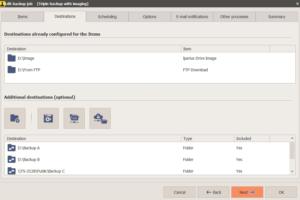
- #Iperius backup compare how to#
- #Iperius backup compare install#
- #Iperius backup compare full#
- #Iperius backup compare portable#
Security:Įach of the options have their own pros and cons when it comes to security, with hosted server backup offering multiple redundancies but the drawback of entrusting your data with a third party.


Servers are the opposite of this and as well as the size issue they also need dedicated and cooled storage so are the more impractical of these two options.
#Iperius backup compare portable#
NAS storage devices are portable and easy to move around so that they can be connected to a router or switch, with this being one of the major design principles. Rather than memory space, this category relates to the physical dimensions of the device and in this category the NAS is the comfortable winner. NAS storage can also be increased, but due in general there is less scope for expanding the capacity than the server options. Expandability:Īll of the options available will offer the ability to expand the storage capacity but it is the file server that leads the way in scalability with both local and off-site hosted servers offering the widest range when increasing the size of the storage memory. The other two methods will have license and purchase costs for the hosted off-site server backup and NAS storage options respectively, but will not cost as much to setup and operate. Cost:Īs a locally installed file server is, after all, a server this will cost more than a NAS to purchase outright and in addition to this with the amount of power that they use it and cooling needed will see a local file server be the most costly of the options that from the choice of either a file backup server and NAS server.

We’ve reviewed a number of criteria that applies to both below and come to a decision. The biggest question when deciding between these two options is: Which is best for you and your business: File Server Backup or NAS Storage Backup?
#Iperius backup compare full#
The Iperius Backup software also offers a dedicated section for NAS server backup and the full tutorial on installing and running the backup can be read here –. All the user needs to do is connect the NAS device to the router or switch and then add the backup software to ensure that they’re ready to go and make their data secure. Using a NAS storage device (or Network-Attached Storage to give its full and correct name) for a backup allows the user overseeing the backup of data to take care of an entire network of multiple devices at the same time. The only decision to be made from here is what form of backup will be created for the data and whether to shorten the timeframe by running incremental or differential backups.
#Iperius backup compare install#
To create a file server backup users only need to setup a server, either locally or hosted off-site, in which they can transfer their data to and then install software, such as the Iperius Backup software ( ), on the device or devices in which they will be backing up date from to allow easy access for the creation and running of backups. We take a look at both of these options, how they compare and what may be the best choice. Two of the most popular options for small companies to protect their data interests from accidental deletion, corruption or damage from outside forces, such as fire or storms, are using a dedicated backup server or to store their data on a NAS server.
#Iperius backup compare how to#
Of course there is no decision to be made about whether or not to backup your data (the answer is yes you should, in case you had any doubts!) but for many small businesses there is a big decision to be made on how to secure their vital information.


 0 kommentar(er)
0 kommentar(er)
